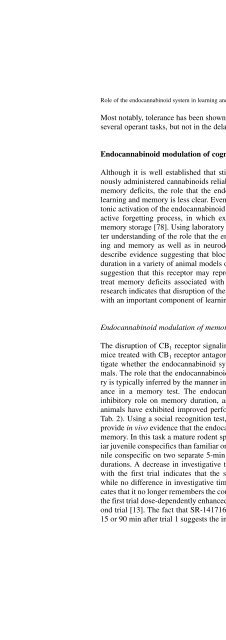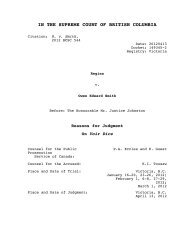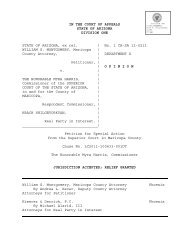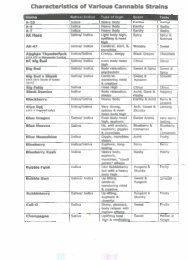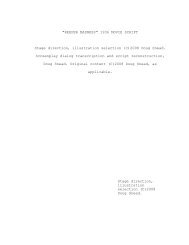3. Umbruch 4.4..2005 - Online Pot
3. Umbruch 4.4..2005 - Online Pot
3. Umbruch 4.4..2005 - Online Pot
You also want an ePaper? Increase the reach of your titles
YUMPU automatically turns print PDFs into web optimized ePapers that Google loves.
Role of the endocannabinoid system in learning and memory 119<br />
Most notably, tolerance has been shown to develop to the effects of ∆ 9 -THC in<br />
several operant tasks, but not in the delayed-alternation T-maze.<br />
Endocannabinoid modulation of cognitive processes<br />
Although it is well established that stimulation of CB 1 receptors by exogenously<br />
administered cannabinoids reliably produces potent and fairly specific<br />
memory deficits, the role that the endogenous cannabinoid system plays in<br />
learning and memory is less clear. Even prior to the discovery of anandamide,<br />
tonic activation of the endocannabinoid had been proposed to play a role in an<br />
active forgetting process, in which extraneous information is deleted from<br />
memory storage [78]. Using laboratory animal models, we hope to gain a better<br />
understanding of the role that the endocannabinoid system plays in learning<br />
and memory as well as in neurodegenerative disease states. Below, we<br />
describe evidence suggesting that blocking CB 1 receptors prolongs memory<br />
duration in a variety of animal models of cognition. In addition, there is some<br />
suggestion that this receptor may represent a potential therapeutic target to<br />
treat memory deficits associated with Alzheimer’s disease. However, other<br />
research indicates that disruption of the endocannabinoid system can interfere<br />
with an important component of learning, the process of extinction.<br />
Endocannabinoid modulation of memory duration<br />
The disruption of CB 1 receptor signaling through the use of CB 1 –/– mice and<br />
mice treated with CB 1 receptor antagonists are common approaches to investigate<br />
whether the endocannabinoid system is tonically active in whole animals.<br />
The role that the endocannabinoid system plays in learning and memory<br />
is typically inferred by the manner in which either approach alters performance<br />
in a memory test. The endocannabinoid system appears to play an<br />
inhibitory role on memory duration, as CB 1 –/– mice and SR-141716-treated<br />
animals have exhibited improved performance in several memory tasks (see<br />
Tab. 2). Using a social recognition test, Terranova et al. [13] were the first to<br />
provide in vivo evidence that the endocannabinoid system tonically modulates<br />
memory. In this task a mature rodent spends more time investigating unfamiliar<br />
juvenile conspecifics than familiar ones. Subjects are presented with a juvenile<br />
conspecific on two separate 5-min trials separated by a delay of varying<br />
durations. A decrease in investigative time during the second trial compared<br />
with the first trial indicates that the subject ‘remembered’ the conspecific,<br />
while no difference in investigative time between the two presentations indicates<br />
that it no longer remembers the conspecific. SR-141716 given 5 min after<br />
the first trial dose-dependently enhanced memory 120 min later during the second<br />
trial [13]. The fact that SR-141716 was ineffective when administered at<br />
15 or 90 min after trial 1 suggests the involvement of consolidation processes.


